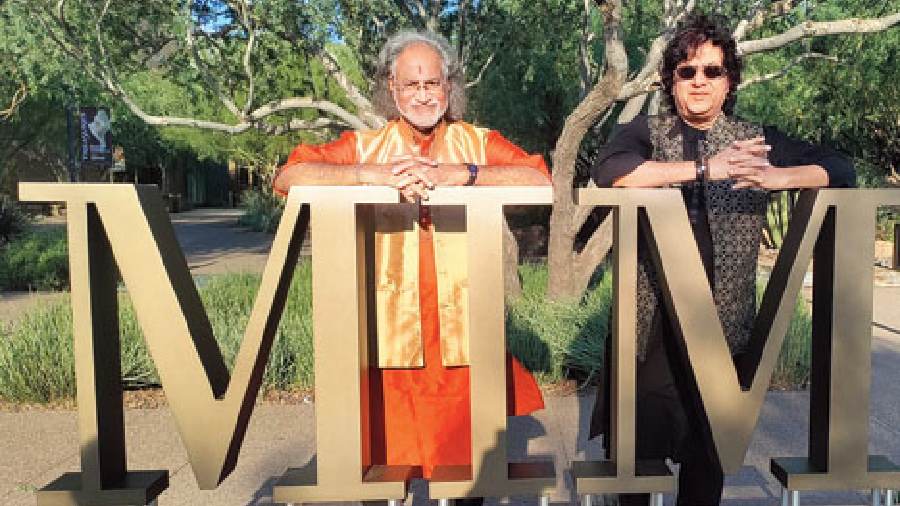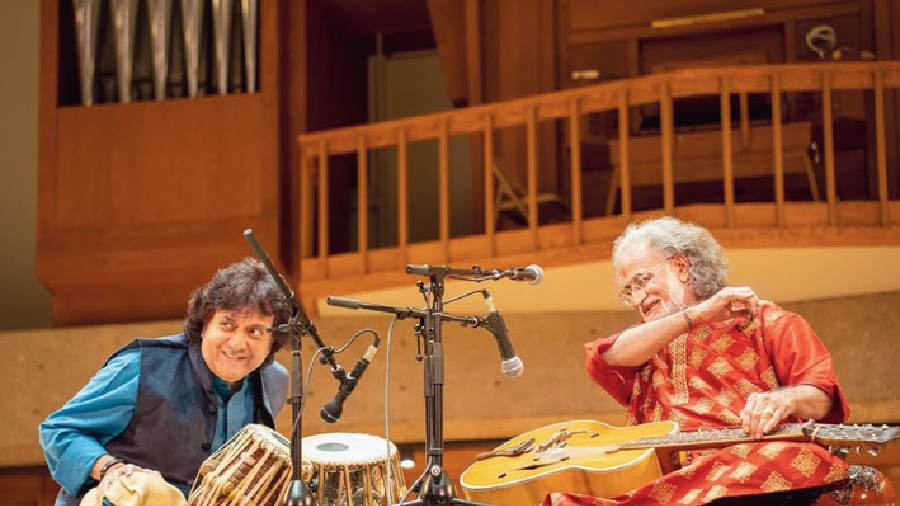In September-October Pandit Vishwa Mohan Bhatt and Subhen Chatterjee put together a 24-concert tour over seven weeks in some of the major cities in the US, like New York, New Jersey, Los Angeles, Florida and Chicago. Subhen Chatterjee on the tabla and Pandit Vishwa Mohan Bhatt on his self-created Mohan veena (Indianised version of the Hawaiian guitar) created magic. During the tour they performed at the Musical Instrument Museum in Arizona, Bharat Ke Aazadi Ka Mahotsav concert in New York, celebrated the birth centenary of Pandit Ravi Shankar in San Diego and more. A chat with the veteran classical musicians who have been playing together for 30 years.
How long did it take to organise the tour?
Subhen Chatterjee: The tour was organised by a professional agent based in the US and they took nearly two years to make this happen.
You’ve been playing for 30 years together. What was new or different about the tour?
Vishwa Mohan Bhatt: Having played together for more than 30 years, we share a fantastic camaraderie and always keep sharing new ideas on how to make our concerts more interesting without diluting the basic essence of Indian classical music, by engaging our audiences, by making them hum along with traditional ghazals, like Aab jane ki zid na karo or traditional Rajasthani folk, such as Kesariya balam padharo maro desh or a few of my selfcreated semi-classical or even fusion melodies. These things make our concerts “distinctively unique” from regular classical concerts.
How did the two of you begin your journey?
SC: Initially, we started playing together predominantly in classical music soirees. It started with smaller festivals and gradually we landed up playing in almost all the major music festivals in India and also in some of the major venues of the world, like Wortham Center and The Music Box Theatre in Houston, Théâtre de la Ville in Paris, Istana Budaya in Kuala Lumpur, Baxter Theatre Centre in Cape Town, Winspear Centre in Edmonton, Royal Albert Hall in London and Oxford University Hall in Oxford.
Another unique thing that happened between us when we stepped into the world music scene... I launched my band Karma and VMB ji got a Grammy for his album A Meeting By The River in 1994 with ace guitarist Ry Cooder. This triggered both of us to exchange new thoughts in the line of world music. Eventually, we both started playing a lot of world fusion music together and this journey took another turn with a much broader audience across the world.
What is it that you appreciate about each other as musicians?
VMB: The best thing that I like about Subhen ji is that other than being a wonderful tabla player he has not restricted himself to classical music and is quite open to newer ideas. And with his vast knowledge of world music, he puts in ideas, giving a few of my compositions a new dimension.

Pandit Vishwa Mohan Bhatt and Subhen Chatterjee at Musical Instruments Museum in Arizona.The museum is unique and has musical instruments belonging to legends like Pandit Ravi Shankar, Ustad Bismillah Khan, Eric Clapton and George Benson’s guitars
Twenty-four concerts in seven weeks must have been a hectic journey.
VMB: Playing three concerts a week (at times more) and then flying from one end to the other is no joke and indeed too hectic. But after all the hard work when you find those wonderful audiences waiting to listen to you, and that too after a twoyear hiatus, all your tiredness disappears at the blink of an eye.
SC: So true.
Any special concerts or moments that you had during this tour?
SC: Although as a musician all our concerts were special but three concerts I found more special than others. The concert in MIM (Musical Instruments Museum) in Phoenix (Arizona), the one we played in San Diego where the concert was dedicated to legendary sitar maestro Pandit Ravi Shankar, and the one we played in New York City to celebrate the 75th year of Indian Independence where dignitaries from different parts of the world were present. Truly a matter of pride for both of us.
How was the interest and the audience response after two years of a pandemic induced lockdown?
SC: In the beginning both of us were quite apprehensive about it but we really couldn’t imagine the response would be this overwhelming. In most of the venues we had packed shows.
Is there any drastic difference between how music is perceived nationally and internationally?
VMB: Not really, but the only difference that I am finding is that the quality of the audience is getting better internationally.
The Mohan veena has always generated a special interest amongst the audience around the world. Do you think that music students or musicians in the West would one day play this instrument?
VMB: There’s always been a great interest from the time I launched this instrument in the classical music arena but it became more popular, both in India and abroad, after I won the coveted Grammy with ace guitarist Ry Cooder for our album A Meeting By The River in 1994.
What’s your take from this tour?
SC: This tour has had a very positive impact not only on the two of us, but on all musicians who are planning their international tours.
What are your plans for 2023?
SC: In 2023 we are planning a tour of Europe in spring and maybe travel to a few South Asian and Middle Eastern countries also. Negotiations are on. We are also planning an instrumental world music album, incorporating a few well-known international musicians.
